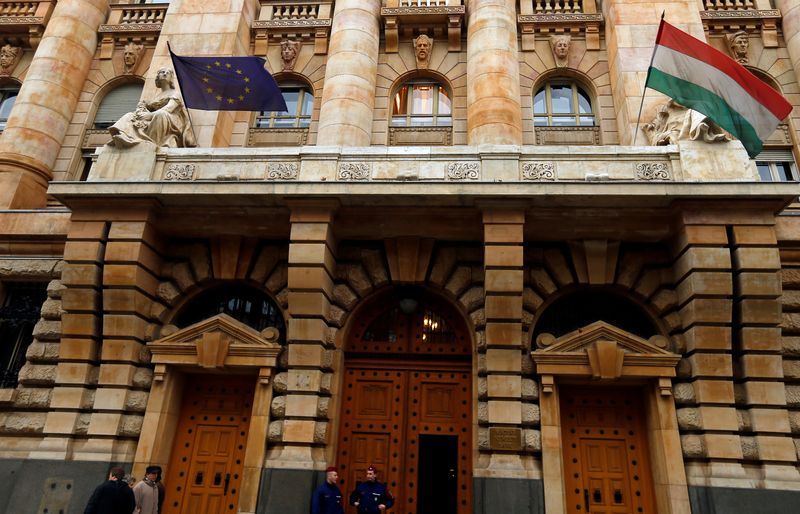Hungary cenbank leaves base rate steady at 13%, as expected
2022.11.22 08:47
[ad_1]

© Reuters. FILE PHOTO: A view of the entrance to the National Bank of Hungary building in Budapest,Hungary February 9, 2016. REUTERS/Laszlo Balogh
By Gergely Szakacs
BUDAPEST (Reuters) – The National Bank of Hungary (NBH) left its base rate unchanged at 13% on Tuesday, as expected, with inflation on track to scale a 26-year-high in 2023 and exceeding the bank’s 2% to 4% policy target range even a year later.
After last month’s emergency rate rise to shore up the forint, Central Europe’s worst-performing currency with a 10% loss versus the euro in 2022, the bank pledged to offer its new quick deposit tool at an 18% rate “as long as necessary”.
On Monday, however, the government capped deposit rates for certain large institutional and private investors at the three-month Treasury bill yield until March, which some analysts said would harm the efficiency of monetary transmission.
At 1301 GMT, the forint was trading at 408 per euro, unchanged from levels before the announcement.
Hungary sold three-month Treasury bills at a 12.82% average yield on Tuesday, while the three-month Budapest Interbank Offered Rate was quoted at 15.45%
“One might ask what a representative weighted average interest rate might be in Hungary, given the confusing plethora of new interest rates plus quantitative tightening being used,” said economist Tatha Ghose at Commerzbank (ETR:).
“Today’s meeting holds limited interest for markets – policy changes are more likely to be announced on other dates outside of this meeting, than today.”
Economists at brokerage Erste Investment said Monday’s government move could channel funds from institutional investors and wealthy private clients towards government bonds.
“The measure can be slightly positive for OTP, however this step impairs the monetary transmission of the central bank,” the analysts said.
Hungary’s forint has been pressured by the NBH prematurely halting rate hikes in September with price growth still on the rise, Hungary’s high exposure to Russian energy imports, and a funding row with the European Union that has hampered access to billions of euros of financing.
Economists project Hungary’s average inflation, also boosted by surging food prices and a government move to curtail household energy subsidies, will rise to 16% next year from 14.3% expected in 2022, while economic growth is seen grinding to a halt.
[ad_2]
Source link








